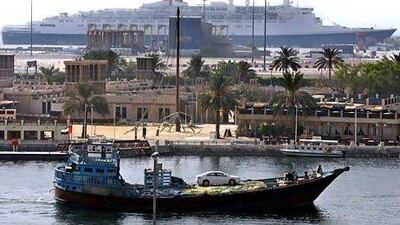It was around this time in 2008 that I was gazing out of my top-storey office window at the bustling, vibrant streets and towers of Dubai below. The majestic QE2 was anchored in the shining Arabian Gulf, business was good and the whole country seemed to give off a sense of invincibility; an oasis of everlasting good times awash with opportunity.
But storm clouds were gathering in the West. The boom was turning to bust and the global media was doing its best to make light of just what was happening to the financial system. We all heard about it, but the general consensus was that we were somehow insulated in the GCC from the brunt of the global financial downturn by the pedestal of petrodollars that formed the base of this "economic miracle".
How wrong we were. The regional stock markets started to tumble, but it took a while before liquidity in the banks dried up, and with it the engine of Dubai's growth: property. The growth capital being injected into nascent industries in the region was rapidly withdrawn and people were losing their jobs everywhere. The confidence that was once a hallmark of UAE executives disappeared overnight, and the wheels of this vibrant economy stopped turning.
Contrast this with today. The West is in a new round of debt crises, albeit a more protracted affair, and the eastern bubble may be ready to burst, with both China and India cooling spending while wrestling with soaring inflation. This month stock markets in Abu Dhabi and Dubai slumped to lows not plumbed since February, while the Saudi Arabian market shed 5.6 per cent in one day on the news of the US downgrade.
Yet according to a recent Yougov and Bayt.com survey, 51 per cent of UAE residents are bullish about the country's economy for the year ahead, against only 13 per cent of naysayers. A whopping 29 per cent of people are confident enough to believe that they will splash out on a new vehicle over the next 12 months, and 19 per cent believe they will be buyers in the UAE's much-maligned property market.
So is this a case of lessons not learnt, or is there a rational case for optimism in the UAE for the year ahead?
The case for optimism is compelling: if the primary engine for growth in 2008 was residential and corporate property funded by cheap credit, the engine for next year will be a different kind of construction: infrastructure. The advantage of this is that the massive funding will come from the more reliable coffers of oil-rich GCC governments, rather than the global markets. In fact, Shuaa Capital expected public capital spending in the GCC to reach 10 per cent of GDP this year, up from about 6 per cent in 2008, with Saudi Arabia, the largest economy, leading the way with an eye-opening 18 per cent of GDP against 7 per cent in 2008. The kingdom has committed an impressive US$385 billion (Dh1.41 trillion) to infrastructure over five years.
Roads, bridges, ports, railways and power stations across the region will be followed by schools, hospitals and housing, benefiting the UAE as the regional hub for a wide range of services, logistics and trade. The Emirates remains the most attractive and wealthy market in the GCC in terms of professional human capital, and therefore its competitiveness in terms of attracting jobs in the service sector is likely to remain.
However, there are risks that should concern all of us. Much of the work that needs completing will still require some level of bank financing, and there are threats to liquidity from the fragile global economy. If the policymakers in the US fail to decide on how to further cut spending by the end of the year, the markets could react badly with further downgrading of US debt. The euro zone is by no means back on track, and if shocks emerge to sectors such as the Indian property market, it could wipe billions off the value of investments held on balance sheets globally.
The knock-on effect in the UAE is that the commercial banks will need to reserve more of their funds to meet the shortfall in the value of their investments to achieve their capital adequacy requirements, as opposed to lending to construction firms, healthcare groups and the general public. Banks in the UAE have had a great year, helped in some way by the Arab Spring, where capital from around the region has poured in amid the turmoil. As those countries return to stability so will their cash, further tightening credit in the UAE.
So where does this leave the job market? It is dependent on both sector and profession, with some real winners and losers this year and next. Engineering, health care, education, corporate banking, insurance, logistics, aggregates, fast-moving consumer goods and pharmaceuticals could provide plenty of opportunities. Among the "losers" we might expect the high-end electronics, property, investment banking, asset management, transport and leisure sectors to experience slow to little growth.
All in all, there is cause for reasonable optimism about the year ahead. Intelligent employers will seek to capitalise on demand with confidence by hiring professionals with the skill or potential to thrive. Long gone are the days of hiring with reckless abandon - and good riddance.
Toby Simpson is the managing director of the Gulf Recruitment Group

